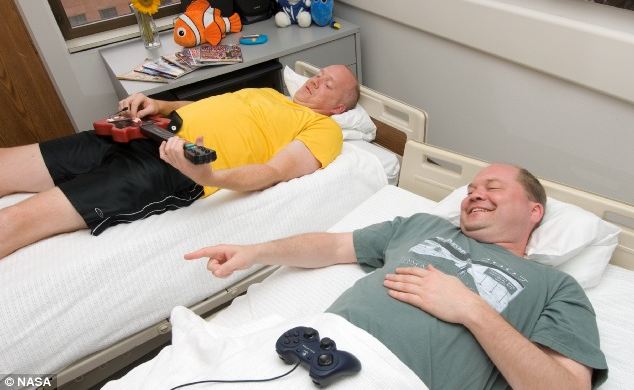
|
Are you someone who will happily spend days sprawled on your sofa watching TV? Or could you sit in the same spot for hours with only a computer game for company? If you answered yes to any of the above questions, then the future of human space travel could rest with you. Nasa is recruiting volunteers to lie a bed for 70 days to research the effects of microgravity on the human body. And the study, which is on-going, will give you around £3,137 ($5,000) a month for the pleasure. The study takes place at the Johnson Space Centre in Houston where you stay for two weeks, doing every day activities, so that scientists can monitor your body in normal conditions. You then spend 70 days in a tilted bed where you will have light for 16 hours per day and darkness for eight hours per day. Access to computer games, TV, books, the internet and visitors is permitted, and all food is provided to keep you at a constant weight. You can even get a shower while you’re in bed. The only time you can move is when scientists carry out tests to find out any changes in bone, muscle, circulation, nutrition and the immune system. Or as part of the newly-introduced exercise called the ‘countermeasure and function testing’ study, that will monitor how different movements can effect muscle size and strength, bone health, and cardiovascular function. Even then you will be lying in bed and will exercise on specially-designed equipment. Following 70 days, there is a 14-day rehabilitation period to get your body back into shape. If all this sounds like your dream come true, applications can be made here. Self-described ‘pillownaut’ Heather Archuletta has taken part in the study three times. ‘I'm a very active person, so it's difficult to be restricted to bed sometimes, but many of us are willing to do it for the sake of future space exploration,’ she wrote on her blog. ‘The... money... is... pretty freaking awesome, however. About $5,000 per month, which is great if you've just graduated, can't find a job, are between jobs, or just plain love space exploration,’ added Ms Archuletta. A similar study is being undertaken by the European's Space Agency's (ESA) Programme for Life and Physical Sciences at the Medes Institute in Toulouse, France. But while it may sound like easy money, it isn’t the walk in the park that it might first seem. During extended periods, microgravity takes a serious toll on the human body. Without the pulls of normal gravity, blood doesn't flow downhill, but pools in the extremities including the face, hands and feet, causing a puffy appearance. And without that downward pressure, height increases. Body mass often decreases with a loss of muscular tissue from nitrogen depletion; the veins and arteries of the legs become weaker, anaemia occurs, accompanied by a reduction in blood count. The most serious concern is the loss of bone calcium that increases with the length of a mission. The calcium loss from bones subjected to extended microgravity takes place at 10 times the rate of an elderly person suffering from osteoporosis. Astronauts report an overall feeling of weakness and loss of balance upon return to Earth, though recovery is nearly complete after a week. Researching the effects of microgravity has been an on-going programme at Nasa for the past 25 years. There are a number of other ways to create low-gravity environments on Earth for research, but these last for short periods of time. For instance releasing experiment samples from tall drop towers provides about four seconds of microgravity. Research aircraft can expose experiments to about 30 seconds of low-gravity while the aircraft approaches the top of a steep climb and begins a sharp descent.
|
你喜欢整天躺在沙发上看电视吗?愿意坐在一个地方玩上数小时的游戏吗?如果答案是肯定的,那么恭喜你,你可以申请成为美国航空航天局的志愿者了。 据英国《每日邮报》9月16日报道,美国国家航空航天局(NASA)正在招聘卧床70天的志愿者,用以研究微重力对人体的研究。志愿者将获得每个月5000美元左右的报酬。 这项研究在休斯敦的约翰逊航天中心进行,志愿者将在那里待上两周,做一些日常活动,让科学家检测其在正常情况下的身体状态。 接下来,志愿者将在一个倾斜的床上躺上70天,每天有16个小时可以见到光,另外8小时则要在黑暗中度过。当然,你可以玩电脑游戏、看电视、看书、上网、会客,获得定量的食物供给,甚至可以在床上淋浴。 然而,只有在研究人员前来检查骨头、肌肉、血液循环、营养和免疫系统的变化时,志愿者才能移动。即便在那个时候,志愿者也只能躺在床上,并接受特制设备的检验。 70天后,志愿者会接受一个14天的康复期,让身体恢复正常。 三次参加该实验的希瑟•阿楚莱塔在博客上写道:“我是一个很活跃的人,所以被困在床上很难受。但是很多人都愿意为了未来的太空探索去做这个实验。报酬还是很丰厚的,大约5000美元一个月。如果你刚毕业,找不到工作,刚辞去上一份工作又没找到下家,或者仅仅是热爱太空探索,都可以去报名参加。” 尽管听上去很容易,但该实验绝不像在公园散步那么简单。长期看来,微重力会对人体产生严重不良影响。血液无法往下流,而是停留在脸部和手足等处,造成浮肿;肌肉组织会随着氮源的消耗而减少,体重随之减轻;腿部的静脉和动脉变弱;随着血细胞减少,将出现贫血症状;骨钙大量流失。 微重力是指重力或其它的外力引起的加速度不超过10e-5~10e-4g。太空环境就是微重力环境。据报道,NASA在过去25年里一直在研究微重力的影响。 相关阅读 (译者 信莲 编辑 王辉) |
|
|
